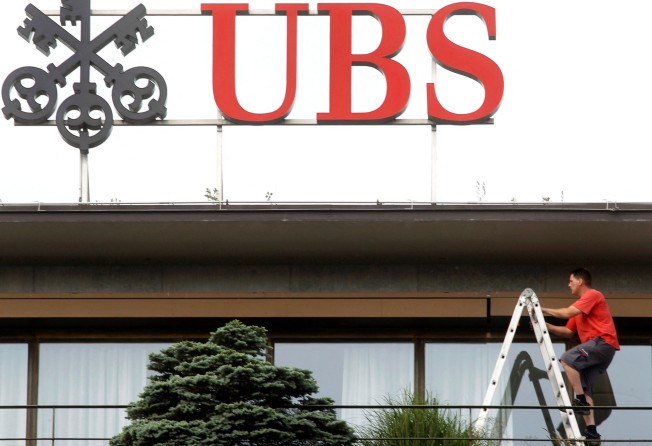
UBS Wealth Management, the investment advisory unit of the Swiss bank, is bullish on gold. Photo: Reuters
Investors should add haven assets like bonds and gold to their portfolios as the US is likely to slide into a recession, prompting the Federal Reserve to unwind financial tightening and the US dollar to weaken, according to UBS Wealth Management.
The consensus view is that the recession may occur in the third or fourth quarter after 10 consecutive interest-rate increases by the Fed, which would send bond yields down and pummel the US dollar, said Hu Yifan, chief investment officer for Asia-Pacific at the investment advisory unit of UBS Group, at a webinar on Monday.

Gold may test a high of US$2,000 an ounce in the next six months, while US stocks are likely to come under pressure because of their high valuation and bleak growth prospects, she said.
“The bond market has become pretty attractive now and it may turn into the biggest bull market in a decade,” said Hu. “Gold is another preferred asset allocation. It’s negatively correlated with the US dollar and inflation, and all these positive factors are still out there in the second half.”

UBS Wealth Management, the investment advisory unit of the Swiss bank, is bullish on gold. Photo: Reuters
The yield on the two-year US Treasury is 86 basis points more than on the 10-year notes, a scenario known as an inverted yield that typically foreshadows a looming recession. Yields have surged this year as the Fed remains hawkish in bringing inflation down to its 2 per cent target. The two-year debt now yields 4.8492 per cent, close to a 17-year high, while the 10-year note yields 3.9838 per cent, near a 16-year high.
The S&P 500 index has risen 15 per cent so far this year, while spot gold prices have gained more than 5 per cent in the span.
Stubborn US inflation that at one point rose at the fastest pace in four decades is on a downtrend following a combined 500 basis points rate increase since March last year, a move that would inevitably wobble growth and the labour market, said Hu.
Gains in US consumer prices moderated for an 11th straight month, to 4 per cent, in May and may have further decelerated to 3.1 per cent last month, according to Bloomberg estimates.
“The key concern of the market has now shifted to the economy from inflation,” said Hu. “We believe that it’ll be a mild recession. Even [if] GDP [gross domestic product] growth contracts, it will be around zero.”

US consumer prices have come down as the Federal Reserve aggressively raised rates to tame inflation. Photo: AFP
Gold will benefit from a weakening US dollar in the second half, as the pause in the rate hike is set to take some heat out of the currency, weakening it against both developed and emerging-market currencies, she said.
Spot gold traded at $1,930.56 an ounce on Tuesday, down about 6 per cent from the year’s high of US$2,050.28 set on May 4.
Meanwhile, investors are looking for clues from Chinese policymakers to boost economic growth that has been stuck in the doldrums after the momentum provided by the lifting of pandemic curbs fizzled out earlier this year.
China’s economy will probably grow as much as 5.5 per cent in the second half, from 4.5 per cent in the first quarter, because of a strong rebound in the services sector and car sales due to government subsidies on new-energy vehicles, according Hu.
The property market, however, will continue to be a drag on the economy in the foreseeable future, eroding growth by 0.3 per cent this year, she said.
President Xi Jinping is expected to convene a meeting of the Politburo, China’s top decision-making body, later this month. Investors are hoping that Beijing will be more proactive in rejuvenating growth. More fiscal stimulus and loosening of the property market are among the possible measures that could be announced.
The supportive policies from the Politburo meeting are expected to be modest and have a low chance of exceeding market expectations, said Min Lan Tan, head of the chief investment office for Asia-Pacific at UBS Wealth Management, at a conference in Hong Kong on Tuesday.
Additional reporting by Mia Castagnone
[ad_2]
Source link